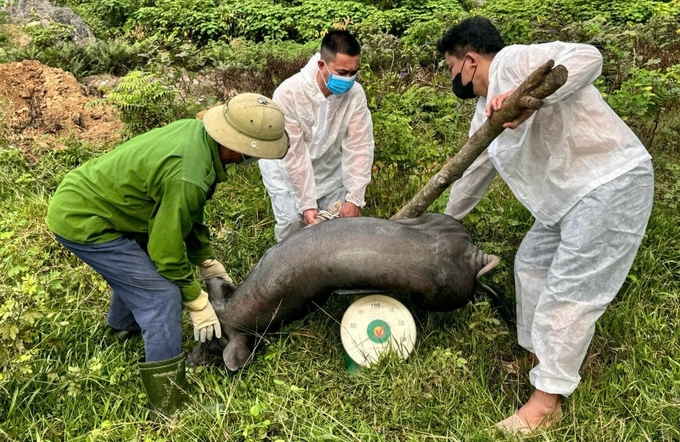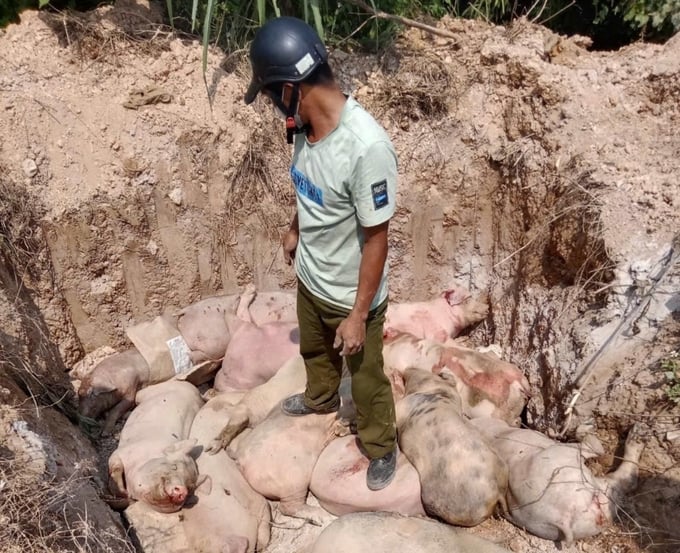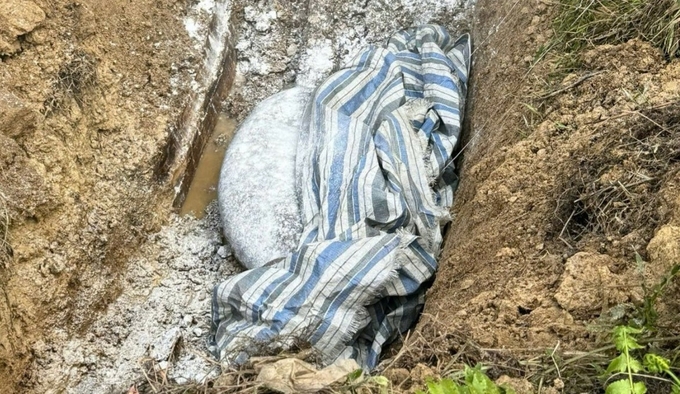December 30, 2025 | 15:09 GMT +7
December 30, 2025 | 15:09 GMT +7
Hotline: 0913.378.918
December 30, 2025 | 15:09 GMT +7
Hotline: 0913.378.918

The African swine fever outbreak is developing in a worrying direction in Nghe An. Photo: Viet Khanh.
Since the beginning of 2024, Nghe An province has recorded 244 outbreaks of African swine fever in many districts, cities and towns with a total of nearly 10,000 pigs forced to be eliminated. The epidemic mainly occurs in small-scale farms, which basically do not ensure disease safety conditions. Nghe An still has more than 60 outbreaks of African swine fever that have not passed the 21-day mark. Considering the current situation, it would be very dangerous if people do not take it seriously.
On November 15, 2024, Vice Chairman of Nghe An People's Committee Nguyen Van De signed Directive No. 45/CT-UBND on "Full focus for drastically and synchronously solutions to prevent and control African swine fever". The goal is to promptly prevent the epidemic, thereby minimizing damage to livestock farmers, and at the same time speeding up the process of restoring production and ensuring food supply for the Lunar New Year.
Based on the practical situation, Nghe An People's Committee requires the Chairmen of the People's Committees of districts, cities and towns; Directors of Departments; Heads of provincial-level departments, branches and related units to focus on implementing actions in accordance with the direction of the provincial Party Standing Committee in Directive No. 29-CT/TU on “strengthening leadership and direction to effectively implement disease prevention and control work” as well as other related directives.
The provincial police force directs functional units to investigate, monitor the situation, and update the list of subjects showing signs of trading, transporting, and consuming smuggled pigs and pig products or those suspected of smuggling and illegal transportation. Local authorities should have measures of education, mobilization and deterrence for proactive disease prevention.

Livestock farmers are devastated as the disease breaks out on a large scale. Photo: Viet Khanh.
As for the Office of Agriculture and Rural Development/Office of Economics, the District Agricultural Service Center, and the Commune People's Committee, it is necessary to closely monitor the epidemic situation, detect early, warn and direct the thorough handling of outbreaks, and prevent new outbreaks from occurring.
Units must increase information dissemination and propaganda to raise farmers’ awareness about the dangerous nature of African swine fever. They must regularly update and report daily developments of the epidemic and prevention work to the Department of Agriculture and Rural Development (through the Sub-Department of Livestock Production and Animal Health) and strictly handle cases of concealment and slow reporting that lead to the spread of the disease.
Overall, the outbreak of African swine fever in Anh Son district is alarming. By the end of October 2024, the district had destroyed about 2,180 infected pigs, equivalent to a loss of over 120 tons. The epidemic spread so quickly that farmers did not know what to do, the majority are now extremely concerned.

Nghe An must control African swine fever to minimize risks for farmers. Photo: Viet Khanh.
Vinh Son commune of Anh Son district holds certain advantages when it comes to livestock farming with a total herd of over 3,500 pigs. The epidemic has basically "covered" all five of its hamlets up to this point, with households reporting sick and dead pigs almost every day.
It is estimated that the whole commune has destroyed hundreds of sick pigs with a total meat loss of over 20 tons. This outbreak of disease has pushed many households into dire straits. One of them is the family of Nguyen Huu The, residing in Vinh Tho hamlet. In early October, African swine fever officially “visited” the farm, spreading widely in the blink of an eye, forcing him to eliminate 13 sows in the breeding period. All the efforts and capital were wasted in an instant, and although heartbroken, the farmers were helpless.
“During the farming process, we have proactively cleaned and disinfected the farm, and limited people from entering and leaving the barn, but the disease still appeared. My family's income depends entirely on the pigs, and now we actually don't know how to handle this situation. At this point, we can't even rebuild the herd, and trying to force the issue will only add to our debt. It's a real dilemma,” said The while giving a sigh.
Translated by Samuel Pham

(VAN) Located in three former provinces, Nam Dinh, Thai Binh, and Ninh Binh, and now in two provinces, Ninh Binh and Hung Yen, "Red River Delta" is the name of Vietnam's first interprovincial coastal wetland World Biosphere Reserve.
/2025/12/29/1046-1-210728_624.jpg)
(VAN) In 2025, Viet Nam recorded severe and extreme disasters, breaking multiple historical records and causing heavy losses in lives, property, and infrastructure nationwide.

(VAN) Applied technologies, water-saving irrigation is a strategic solution to promote climate-resilient agriculture and strengthen water security in the uplands.
/2025/12/29/3936-3-163422_251.jpg)
(VAN) Can Gio mangrove forest in particular and the entire Can Gio Mangrove Biosphere Reserve in general hold great potential for carbon credits.

(VAN) Chu Pah Rubber has announced its products that comply with the EU Deforestation Regulation (EUDR), affirming its commitment to sustainable production and product origin transparency.

(VAN) Deputy Director Nguyen Hoai Nam stated that a digital data platform will be developed with agricultural sector databases, utilizing AI to help farmers make informed decisions on 'watering correctly, sufficiently, and efficiently.’
/2025/12/29/4841-2-134224_777.jpg)
(VAN) From only about 10 individuals in 2009, the wild elephant population in Dong Nai has recovered to nearly 30 animals after more than 10 years.